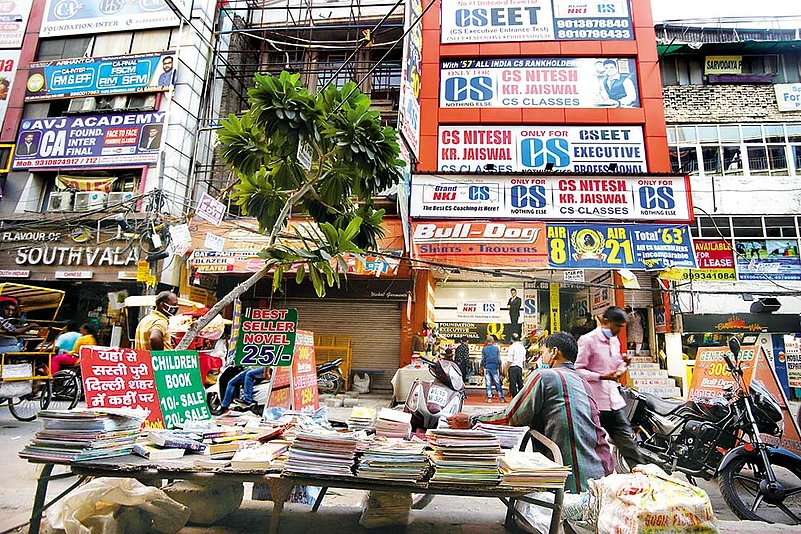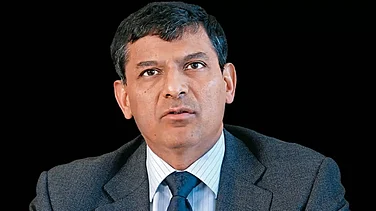The cram schools in Kota sell dreams—a collective ambition to crack the tough tests for enrollment in top colleges such as IITs or any of the 13 AIIMS campuses in India. A degree from one such institution can guarantee a lifetime of fat pay cheques or jobs abroad. This industrial city by the Chambal in Rajasthan is the holy grail of India’s private coaching industry—a roughly Rs 25,000 crore business that fills in for a failed education system and feeds on the aspirations of thousands of students and their middle-class parents. The town has grown since V.K. Bansal, an engineer, founded Bansal Classes in 1985, the first to help students prep for the college entrance tests. The institute’s success triggered a teaching shop boom, with Kota as its unofficial headquarters, the go-to place. The dream that spawned the city’s Rs 4,000-crore industry—about 80 per cent of the city’s economy—is now in pieces. Covid-struck like most businesses, an uncertain cloud hangs low over the rows of coaching centres and those who live off them—owners, teachers, non-teaching staff, hostels, paying guest rentals, canteens, restaurants, food delivery et al.
Hard Knocks On Cram Schools
Students are home, colleges are closed…India’s Rs 25,000-crore coaching industry struggles to survive the Covid pandemic

The signs were there, ominous—when thousands of students were stranded in Kota as the institutes, along with everything else in the country, shut down during the lockdown beginning March 25 to contain the coronavirus pandemic. By April-end and May, they returned home on special buses and trains. Kota lost its livewire and many their livelihood. As the virus outbreak pushed unemployment rates to record numbers, the situation in Kota became especially dire. Rohit Sharma, 44, a senior manager with Sarvottam Career Institute, is one of thousands living the headlines—pay cuts, delayed salaries, furloughs, lay-offs, unemployment. Summer stretched on without a pay cheque—his savings dried up, he barely scrimped by—and overnight, he went from a confident professional to a nervous man unsure of what was next. “At least 5,000 people in the coaching industry are facing a similar fate,” he says. His institute, which prepares medical aspirants for the fiercely competitive national eligibility-cum-entrance test (NEET), closed its branch as it could no longer aff-ord rent. “We have just one institute left at another rental,” Sharma says.
After the coronavirus forced students and staff home, and in-person instruction was suspended, Sarvottam Career Institute, like many others, is offering online tutorials to retain its students. But the fidgety summer of online coaching is not bringing money, not even enough to get by. The more than 70 coaching institutes cannot thrive without its two lakh students, who swot in the city’s heat and dust for the engineering and medical college tests—Joint Entrance Examination (JEE) and NEET—every year. “It has directly impacted livelihood of at least three lakh people,” says Gorkey Godara, who runs Quantum Classes. The big ones such Bansal Classes, Allen Career Institute, Resonance, Motion Classes—among the top seven— might not be pinching pennies. “But surviving the lump will be a challenge for at least 60 smaller and medium institutes, particularly those set up over the past two-three years. They don’t have funds to get by in this crisis,” Godara explains.

Ancillary businesses such as the 25,000 hostels and paying guest accommodations, book and stationary shops, caterers, restaurants and local transport services, which flourished over the years around the cram school boom, are earning almost absolutely nothing without the students. “At least 3,000 hostel owners in Kota are in deep trouble. They have huge loans to repay…the cash they took from banks to build their business. If the moratorium is not extended, people will die,” Naveen Mittal, president of the Kota Hostel Owners Association. “How will we repay our loans without an income? We are waiting for the Supreme Court’s decision.”
Most institutes are cutting costs, especially advertisement and marketing, and teachers and non-teaching staff are either furloughed or laid off. Tuition fee has been reduced to retain students taking classes remotely. Students are all-owed to pay in installments. Yet, enr-ollment figures are down drastically. “We have enough students, but our revenue is down. We reduced our fee by one-fourth because there’re no physical classes, only online coaching,” says Nitin Vijay, director of Motion Classes. His institute hasn’t fired any staff. “It will be difficult to retain staff as the pandemic is not going to go away anytime soon. Teachers will have to accept pay cuts,” he says.
Kota’s troubles are symptomatic of the overall plight the coaching industry in Delhi, Uttar Pradesh, Maharashtra, and down south is facing. The Maharashtra Class Owners Association (MCOA), a union of cram school operators, has asked the state government to give coaching institutes the status of micro, small and medium enterprises (MSME). This will allow the institutes to take bank loans. “Smaller institutes will perish if the government does not come to their rescue. Classrooms are in disuse, but rent has to be paid. Enrollment is down 70 per cent, collecting fee is a big test. It’s a terrible situation,” MCOA vice president Santosh Vaskar says.
Maharashtra has more than one lakh institutes—at least 40,000 in Mumbai alone. “Many teachers lost their job as institutes don’t have money to pay salaries,” Vaskar says. Institute owners want the in-person classes to resume. “When 52 people can travel on a bus, when government employees can work in state secretariats and offices, why can’t coaching ins-titutes resume classes?” asks Uttar Pradesh Coaching Welfare Association president Vijay Singh. Bring guidelines to reopen the institutes and “take action against offenders”, he says. The institutes will reopen eventually, with a skeleton crew and a pay cut perhaps. It won’t be the return anyone planned for. For most, it won’t be a return at all.

























